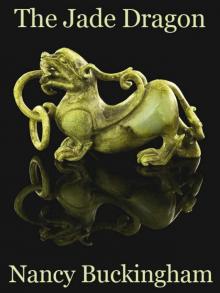- Home
- Nancy Buckingham
Quest for Alexis Page 2
Quest for Alexis Read online
Page 2
By then, Alexis and Madeleine had been living in England for nearly twelve months.
In the intervening years, they had been through a terrible time. Though feared and hated by the Novotny regime, Alexis himself had been too popular a hero to be attacked directly. So Madeleine was used as a weapon against him, in a vicious game of cat-and-mouse. She would be picked up for interrogation by the secret police, sometimes for days at a time, returning from these sessions in a condition of dazed shock.
It was by such methods that they succeeded in silencing Alexis, until eventually friends in the underground movement managed to smuggle them both out of Czechoslovakia.
But for Madeleine, escape came too late. The mental anguish and physical hardship she suffered, the loss of her baby, born dead, had been more than my poor aunt could withstand. She was now a semi-invalid and would remain so for the rest of her life. She spent most of the time in her room, and often her withdrawal from reality was so complete it seemed impossible to get through to her.
It was Alexis who’d had to shoulder the whole burden of responsibility for their thirteen-year-old orphaned niece. One terrible day in early June, a day of sticky sweltering heat, he had arrived at my school to break the news of the death of my parents to me. I knew instantly from the look on his face, even before the headmistress left us alone together in her study.
“It’s Mummy and Daddy, isn’t it? Something happened.”
Alexis took me by the shoulders, gently, his gray eyes looking gravely into mine. “Yes, Gail. You must be very brave. The plane crashed. There were no survivors.”
He had driven me back with him to Deer’s Leap, the beautiful, rambling old manor house deep in the Sussex weald where he and Madeleine now lived— thanks to the generosity of Sir Ralph Warrender.
Sir Ralph had been cultural attaché at the Embassy in Prague in the old days. He had not been unaware of what was happening to Madeleine and Alexis, though impotent to help. Sudden blindness had forced Sir Ralph to resign his post. He and Caterina had returned to England and retired to his family home. And when within a year Alexis had arrived in England too, an exile, Sir Ralph had at once stepped in with the offer of the west wing of his manor house as a refuge, as a retreat where Madeleine could spend her days in peace and tranquility.
In the weeks that I stayed at Deer’s Leap before the start of the next school term, a new relationship developed between Alexis and myself—more than just affectionate uncle and adoring niece. I clung to him as the pivot of my existence, the one person who could give meaning to my shattered life. But my feelings for Alexis were not in the least selfish. I always knew that Madeleine’s welfare counted above everything else for him.
“Your poor aunt endured more than I can possibly tell you,” he confided to me in those first few days. “A number of times I pleaded with her to leave Czechoslovakia and go back to England so that she would be safe. You see, marrying me had not deprived her of her British nationality, so it could have been arranged. But Madeleine refused to consider leaving the country if it meant leaving me.” Alexis blinked away the tears that had come into his eyes and smiled at me. “And now, Gail, you and I will look after her together, won’t we?”
We became, as it were, conspirators in caring for Madeleine, with an unspoken pact that she was to be sheltered and protected at all costs. Alexis was shrewd enough to understand, I think, that this intense concentration on someone else’s needs was the best possible thing for me just then, helping me to overcome the grief I felt at my parents’ death.
From then on Deer’s Leap became my home, and I grew to love every mellow stone of it, every nook and moss-filled crevice. There was a timeless quality about the ancient manor, as if its very fabric had grown out of the sandy heath upon which it stood. The grounds, except for some hard-won lawns and rock gardens just around the house and terrace, defied all attempts at taming with domestic plants. It was a lovely wilderness of bracken and heather, with dense encroaching clumps of wild rhododendron and quiet woodland glades where a spotted fallow deer could now and then be glimpsed. A wonderful playground for a solitary, imaginative child. I loved the lake, where I swam when it was warm, and used to spend hours drifting in the dinghy while I read a book or just lay back in dreamy contemplation, waiting for a kingfisher to swoop down from the conifers and pluck a small trout from the water.
And after I left school and was working in London, Deer’s Leap was still the place I loved to be above all others. Most weekends when I could get away I would drive down to Sussex. If the offer of a six-month spell at BFC’s New York office had come at some other time, I might even have turned it down. But when it did come, it seemed like a deliverance from Brett Warrender.
It was at Deer’s Leap that I met Brett again for the first time since I was a child. I had known him before in Czechoslovakia, known and disliked him with single-minded intensity.
Brett had spent much of the long vacation—he was at Cambridge then—visiting his father in Prague just after Sir Ralph had married Caterina. Since both of us were the offspring of Embassy officials, it was inevitable that our paths should cross now and again.
At first I had approved of Brett enormously, because he spoke to me in such a friendly, natural way, with no hint of condescension despite his nineteen years to my ten. But I gathered, from an amused remark tossed across the luncheon table, that “young Brett” wasn’t backward and knew his way around with women. And it wasn’t long before I received humiliating proof of that.
We were in an anteroom at the Embassy one afternoon, deep in an absorbing discussion—Brett doing the talking and me a rapt listener—about the new wave of Czech film directors.
“Men like Mrynych and Milos Forman have a completely fresh approach to the problem of ...” He broke off as the door behind me opened. It was Eileen Peters, an Embassy secretary. Eileen had ash-blond hair and long shapely legs—and instantly she was the target of all Brett’s attention.
“Oh, I was looking for your father,” she said with a coy little laugh.
Brett awarded her a dazzling smile. “Won’t I do instead?”
“Well, that depends.”
I was totally forgotten. Wretchedly, I crept out of the room, and I doubt that Brett even noticed my going.
I might have forgiven him this once, but a few days later it happened again, with some other girl. I was furious. I was madly jealous. I vowed I would hate and despise Brett Warrender forever.
And nothing in the intervening years had caused me to change my opinion. On getting his honors degree, Brett had rebelled against going into the diplomatic service like his father. Instead, he had spent two or three years roaming the world doing his own thing before eventually landing a job as a TV man-on-the-spot reporter. This proved to be just his metier, and Brett rapidly became one of the small screen’s best-known faces.
By a strange combination of circumstances, we had never met in all this while, even though I was at Deer’s Leap so often. Brett spent a great deal of his time abroad. When he did come home to visit his father and stepmother, it just so happened that I had always missed seeing him.
Now and then I’d watched Brett on TV, and these programs only confirmed my preformed judgment of him. An overconfident man, an arrogant man—too aware of his own ability, far too aware of his attractiveness to women.
So when I arrived at Deer’s Leap one Saturday for the weekend, it was with mixed feelings that I learned we had all been invited to dine with the Warrenders because Brett would be at home.
“We were working it out,” said Alexis. “You two haven’t met each other since that summer in Prague, have you?”
At least it would be interesting, I told myself, actually to see him in the flesh after all this time.
At seven-thirty Alexis, Madeleine, Rudi, and I trooped through the doorway that divided the two parts of the house, a door that was always left unlocked, though seldom used unless by invitation.
The Warrenders were in their drawing room
—the beautiful Ivory Room that had always fascinated me, filling me with wonder at the hours of dedicated craftsmanship that had gone into the carving of those fragile treasures. The two men rose to their feet to greet us, and Sir Ralph held out his hand to me, smiling the unseeing smile of a blind man.
“Gail, my dear, you are always welcome. And this evening doubly so. My son has been looking forward to seeing you again.”
I turned to Brett, and our eyes met. Until the day I die, I shall be able to recall the exact quality and texture of that moment. The sudden tensing of my heart muscles, the feeling of panic, of struggling for breath, the lost, despairing sensation that I was drowning.
From the sofa by the fire, Caterina gave her musical laugh. “Well, Brett, what do you say? Gail is no longer a shy little schoolgirl, is she?”
He grinned at his stepmother affectionately. “I hate to contradict you, Caterina, but I deny that Gail was ever shy. An intelligent and fascinating child, as I recall—when she wasn’t sulking.”
It was almost a relief to find that Brett could still infuriate me.
Over dinner it emerged that Brett was now in a position to pick and choose his assignments. In the future, it was unlikely that he would need to spend so much of his time abroad. “We hope we shall be seeing a great deal more of him from now on,” his father told us.
Across the table I met Brett’s eyes again and read the challenging message in them. I glanced away hastily, disturbed and confused. By the end of the evening I felt strangely tired, almost exhausted, as if I had been under an unbearable strain.
Next morning at breakfast Alexis asked me casually, “What did you think of Brett?”
The shattering effect of his personality was still upon me. But I fought against it. “He has a high opinion of himself, I’d say.”
“With good reason,” said Alexis mildly. “Brett has a clever mind, and his analysis of a political situation is very acute.”
I gave a casual shrug. “Oh, well, I doubt that I’ll be joining his fan club.”
On Monday morning Brett called me at the Mayfair offices of Brand, Feiffer, and Coles. He came to the point without any preamble.
“Gail, you must have dinner with me tonight.”
The curious feeling of panic gripped me again, but it didn’t even occur to me to refuse or invent some excuse. I knew when I was defeated. I just said, “Yes, of course.”
“I’ll pick you up at your place at seven-thirty— okay? And by the way, Gail, keep the rest of the week free. I’ve a feeling we’ll want to see a lot of each other from now on.”
And we did. Too much, perhaps. Our relationship was too intense, too urgent, too demanding. Looking back, I think I was never truly happy. I felt so unsure of Brett, and each time I saw him I dreaded that this might be the last time. I knew jealousy such as I had never experienced with any other man. He made me angry, and we often quarreled, so that I lived always on the edge of despair. But the times when everything was good between us seemed to make up for all the rest.
And then, suddenly, with the spring, it was over.
I still went down to Deer’s Leap quite often on weekends, but Brett kept clear when I was there. He accepted a couple of assignments abroad that took him away for most of the summer. Alexis, with his usual tact, didn’t press me for details, and I made no attempt to explain. For all our closeness, this was something too painful to be talked about.
It was in the autumn that Alexis told me about the plans for a documentary on his life and work.
“You mean Brett is going to make it?” I exclaimed, horrified. “But why Brett? Why does it have to be him?”
Alexis gave me a brief, pitying smile.
“It’s almost an honor, really. Brett is a top name in television nowadays, and of course he’s known me for so long that he understands the way I think. For myself, I couldn’t be more pleased.” My uncle regarded me intently. “You see, my dear, Brett Warrender’s stamp on the film will help it make a big impact, and I want all the publicity I can get at the moment. It will help achieve a widespread sale for my book.”
Alexis didn’t need to explain to me that he wasn’t concerned about the money involved, except insofar as it would allow him to give further aid to his refugees. This new book took the lid off a great deal that the Communists would have liked to keep hidden about the Stalinist trials of the 1950s.
“Men like Clementis and Slansky were hanged, Gail, in order to terrify the whole nation and keep it subdued. The methods they used to extract false confessions—the methods they used on innocent people like poor Madeleine—these things need to be told. They have never been properly understood in the West. This is my chance to make them understood.”
I supported my uncle all the way, of course, but still I felt dismayed that Brett should be the one to make the film that was to tie in with his book.
Alexis went on, “Brett and his production team will be in and out of Deer’s Leap for quite some time.” He ran his fingers through his thick white hair, a sign of nervousness. “I don’t mind admitting that I’ve had great hopes, Gail. Perhaps, seeing a lot of each other again, you will be able to be friends once more. Who knows, you might even—”
I cut in quickly, my pride at stake. “I’m afraid I’m likely to be very busy myself in the next few months. I doubt if I’ll be able to get down here very often.”
I would have been hard put to it to find excuses for skulking in my Bayswater apartment every weekend. But fate decided to be kind. Only a week later Tom Grant, the London boss of Brand, Feiffer, and Coles, sent for me.
“How would you like to do a stint in the New York office, Gail? They’ve suggested an exchange of staff to compare our working methods.”
It seemed the perfect answer to my problem. Moreover, it sounded exciting, a challenge, something to give me a new interest and break free from the state of dull apathy I’d been living in these past months.
“Great,” I said, “count me in!”
Tom Grant raised his thick eyebrows and grinned. “Can you really say yes just like that? You amaze me, Gail. Haven’t you any ... male entanglements at the moment?”
“No entanglements,” I said firmly.
In New York I received regular progress reports from Alexis on the film-making. He was very happy about it and full of praise for Brett. He also made constant references to Elspeth Vane, the film’s producer. A charming woman, he wrote, intelligent and talented as well as beautiful.
Alexis clearly had no idea that he was twisting a knife in my heart.
I was infinitely thankful for the lucky chance that had removed me from Deer’s Leap at this time. And I guessed that Brett was equally thankful not to have me around. A break like ours must be clean-cut. Final.
* * * *
The plane descended out of the murky sky and landed at London Airport a frustrating two hours late. There was no snow here, not even the threat of it. The air was raw as only English air can be, laden with a cold penetrating dampness. I was in no mood to waste time on airport buses and trains. Extravagantly, I hired a car to take me all the way to Deer’s Leap.
There was a sad, lost look of winter upon the countryside, a veil of creeping mist dimming the starkness of bare fields. It didn’t help my feeling of desolation.
At last we left the main roads behind and slipped through the deserted Sussex lanes, high-banked with crumbly sandstone. Leafless oak and elm trees arched overhead.
“It’s just along here on the right,” I told the driver as we crested the last rise. “You’ll see the gateposts in a second.”
He braked and swung between the tall stone pillars, each capped with a delicately sculpted leaping deer. Gravel crunched wetly under the tires as we swept up the drive, and the sodden rhododendron bushes rose on either side, dark and impenetrable.
There were already a couple of cars on the forecourt, drawn up by the Gothic-arched porch that was the main entrance, the entrance used by the Warrenders. The house was L-shaped, and t
he west wing formed the leg, with its own front door. I told the driver to stop there. The moment I had paid him he shot off again, leaving me standing beside my cases. I lingered for a few moments, staring up at Deer’s Leap.
Every outline, every feature, was blurred by the clammy mist. The pointed gables and twisted chimney stacks, the tall mullioned windows with their diamond leaded panes. Where it showed behind the clinging ivy, the time-worn stonework was dark with damp. But even like this, at its most uninviting, I still loved the old house.
Picking up my cases, I turned toward the door. Just as I got there it opened and a stranger came out. Rudi was right behind him, standing in the doorway. His eyes flashed me a warning look.
“Ah ... good afternoon,” he greeted me in a formal voice. “I heard the car arriving. I’ll be with you in just a moment.” He returned his attention to the man. “I’m sorry I can’t give you any further information, but there it is.”
The man, huddled in a short tweed overcoat, nodded to Rudi, flicked me a casual glance, and walked off toward one of the cars. We went inside and Rudi closed the door behind us.
“I’m sorry to have sounded so unwelcoming, Gail. But that was a reporter and I didn’t want him to guess who you were.”
A shiver ran through me. “A reporter? Have they discovered anything, Rudi? Is there any news?”
His deep-set dark eyes, usually so alive when they looked at me, were clouded with distress.
“So you haven’t seen a newspaper since you landed?”
“No, I didn’t stop to ...” My heart began to thud, and I felt suddenly queasy. “Rudi, what is it?”
He hesitated, then said reluctantly. “The news came through this morning. Alexis has been seen, Gail.”
“Seen? What does that mean? Where has he been seen?”
“In Majorca. Alexis is in Majorca, staying at some luxury hotel. Belle Forsyth is with him.”

 The Other Cathy
The Other Cathy Design for Murder
Design for Murder Valley of the Ravens
Valley of the Ravens The October Cabaret
The October Cabaret Model Murder
Model Murder Murder in the Cotswolds
Murder in the Cotswolds Deadly Deceit
Deadly Deceit Return to Vienna
Return to Vienna Shroud of Silence
Shroud of Silence The Silver Castle
The Silver Castle A Cotswolds Legacy
A Cotswolds Legacy Marianna
Marianna Cold Coffin
Cold Coffin Kiss of Hot Sun
Kiss of Hot Sun Call of Glengarron
Call of Glengarron Quest for Alexis
Quest for Alexis The Jade Dragon
The Jade Dragon